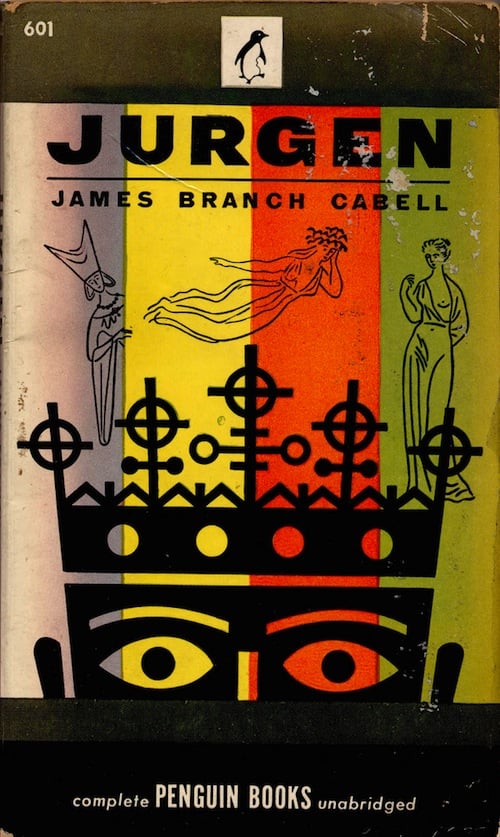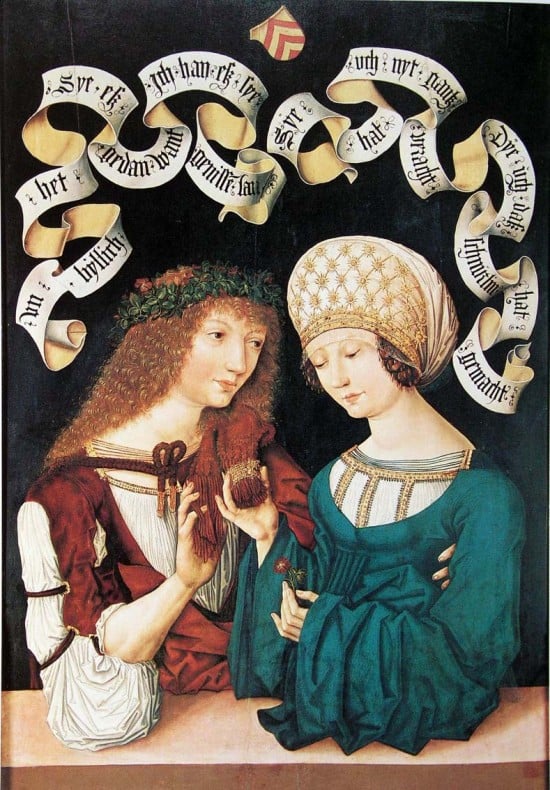Jurgen (15)
By:
June 21, 2015

James Branch Cabell’s 1919 ironic fantasy novel Jurgen, A Comedy of Justice, the protagonist of which seduces women everywhere he travels — including into Arthurian legend and Hell itself — is (according to Aleister Crowley) one of the “epoch-making masterpieces of philosophy.” Cabell’s sardonic inversion of romantic fantasy was postmodernist avant la lettre. HiLoBooks is pleased to serialize Jurgen here at HILOBROW. Enjoy!
So Jurgen abode at court, and was tolerably content for a little while. He loved a princess, the fairest and most perfect of mortal women; and loved her (a circumstance to which he frequently recurred) as never any other man had loved in the world’s history: and very shortly he was to stand by and see her married to another. Here was a situation to delight the chivalrous court of Glathion, for every requirement of romance was exactly fulfilled.
Now the appearance of Guenevere, whom Jurgen loved with an entire heart, was this: — She was of middling height, with a figure not yet wholly the figure of a woman. She had fine and very thick hair, and the color of it was the yellow of corn floss. When Guenevere undid her hair it was a marvel to Jurgen to note how snugly this hair descended about the small head and slender throat, and then broadened boldly and clothed her with a loose soft foam of pallid gold. For Jurgen delighted in her hair; and with increasing intimacy, loved to draw great strands of it back of his head, crossing them there, and pressing soft handfuls of her perfumed hair against his cheeks as he kissed the Princess.

The head of Guenevere, be it repeated, was small: you wondered at the proud free tossing movements of that little head which had to sustain the weight of so much hair. The face of Guenevere was colored tenderly and softly: it made the faces of other women seem the work of a sign-painter, just splotched in anyhow. Gray eyes had Guenevere, veiled by incredibly long black lashes that curved incredibly. Her brows arched rather high above her eyes: that was almost a fault. Her nose was delicate and saucy: her chin was impudence made flesh: and her mouth was a tiny and irresistible temptation.
“And so on, and so on! But indeed there is no sense at all in describing this lovely girl as though I were taking an inventory of my shopwindow,” said Jurgen. “Analogues are all very well, and they have the unanswerable sanction of custom: none the less, when I proclaim that my adored mistress’s hair reminds me of gold I am quite consciously lying. It looks like yellow hair, and nothing else: nor would I willingly venture within ten feet of any woman whose head sprouted with wires, of whatever metal. And to protest that her eyes are as gray and fathomless as the sea is very well also, and the sort of thing which seems expected of me: but imagine how horrific would be puddles of water slopping about in a lady’s eye-sockets! If we poets could actually behold the monsters we rhyme of, we would scream and run. Still, I rather like this sirvente.”
For he was making a sirvente in praise of Guenevere. It was the pleasant custom of Gogyrvan’s court that every gentleman must compose verses in honor of the lady of whom he was hopelessly enamored; as well as that in these verses he should address the lady (as one whose name was too sacred to mention) otherwise than did her sponsors. So Duke Jurgen of Logreus duly rhapsodized of his Phyllida.
“I borrow for my dear love the appellation of that noted but by much inferior lady who was beloved by Ariphus of Belsize,” he explained. “You will remember Poliger suspects she was a princess of the house of Scleroveus: and you of course recall Pisander’s masterly summing-up of the probabilities, in his Heraclea.”
“Oh, yes,” they said. And the courtiers of Gogyrvan Gawr, like Mother Sereda, were greatly impressed by young Duke Jurgen’s erudition.
For Jurgen was Duke of Logreus nowadays, with his glittering shirt and the coronet upon his bridle to show for it. Awkwardly this proved to be an earl’s coronet, but incongruities are not always inexplicable.
“It was Earl Giarmuid’s horse. You have doubtless heard of Giarmuid: but to ask that is insulting.”
“Oh, not at all. It is humor. We perfectly understand your humor, Duke Jurgen.”
“And a very pretty fighter I found this famous Giarmuid as I traveled westward. And since he killed my steed in the heat of our conversation, I was compelled to take over his horse, after I had given this poor Giarmuid proper interment. Oh, yes, a very pretty fighter, and I had heard much talk of him in Logreus. He was Lord of Ore and Persaunt, you remember, though of course the estate came by his mother’s side.”

“Oh, yes,” they said. “You must not think that we of Glathion are quite shut out from the great world. We have heard of all these affairs. And we have also heard fine things of your duchy of Logreus, messire.”
“Doubtless,” said Jurgen; and turned again to his singing.
“Lo, for I pray to thee, resistless Love,” he descanted, “that thou to-day make cry unto my love, to Phyllida whom I, poor Logreus, love so tenderly, not to deny me love! Asked why, say thou my drink and food is love, in days wherein I think and brood on love, and truly find naught good in aught save love, since Phyllida hath taught me how to love.”
Here Jurgen groaned with nicely modulated ardor; and he continued: “If she avow such constant hate of love as would ignore my great and constant love, plead thou no more! With listless lore of love woo Death resistlessly, resistless Love, in place of her that saith such scorn of love as lends to Death the lure and grace I love.”
Thus Jurgen sang melodiously of his Phyllida, and meant thereby (as everybody knew) the Princess Guenevere. Since custom compelled him to deal in analogues, he dealt wholesale. Gems and metals, the blossoms of the field and garden, fires and wounds and sunrises and perfumes, an armory of lethal weapons, ice and a concourse of mythological deities were his starting-point. Then the seas and heavens were dredged of phenomena to be mentioned with disparagement, in comparison with one or another feature of Duke Jurgen’s Phyllida. Zoology and history, and generally the remembered contents of his pawnshop, were overhauled and made to furnish targets for depreciation: whereas in dealing with the famous ladies loved by earlier poets, Duke Jurgen was positively insulting, allowing hardly a rag of merit. Still, he was careful to be just: and he allowed that these poor creatures might figure advantageously enough in eyes which had never beheld his Phyllida. And to all this information the lady whom he hymned attended willingly.
“She is a princess,” reflected Jurgen. “She is quite beautiful. She is young, and whatever her father’s opinion, she is reasonably intelligent, as women go. Nobody could ask more. Why, then, am I not out of my head about her? Already she permits a kiss or two when nobody is around, and presently she will permit more. And she thinks I am quite the cleverest person living. Come, Jurgen, man! is there no heart in this spry young body you have regained? Come, let us have a little honest rapture and excitement over this promising situation!”
But somehow Jurgen could not manage it. He was interested in what, he knew, was going to happen. Yes, undoubtedly he looked forward to more intimate converse with this beautiful young princess, but it was rather as one anticipates partaking of a favorite dessert. Jurgen felt that a liaison arranged for in this spirit was neither one thing or the other.
“If only I could feel like a cold-blooded villain, now, I would at worst be classifiable. But I intend the girl no harm, I am honestly fond of her. I shall talk my best, broaden her ideas, and give her, I flatter myself, considerable pleasure: vulgar prejudices apart, I shall leave her no whit the worse. Why, the dear little thing, not for the ransom of seven emperors would I do her any hurt! And in these matters discretion is everything, simply everything. No, quite decidedly, I am not a cold-blooded villain; and I shall deal fairly with the Princess.”

Thus Jurgen was disappointed by his own emotions, as he turned them from side to side, and prodded them, and shifted to a fresh viewpoint, only to find it no more favorable than the one relinquished: but he veiled the inadequacy of his emotions with very moving fervors. The tale does not record his conversations with Guenevere: for Jurgen now discoursed plain idiocy, as one purveys sweetmeats to a child in fond astonishment at the pet’s appetite. And leisurely Jurgen advanced: there was no hurry, with weeks wherein to accomplish everything: meanwhile this routine work had a familiar pleasantness.
For the amateur co-ordinates matters, knowing that one thing axiomatically leads to another. There is no harm at all in respectful allusions to a love that comprehends its hopelessness: it was merely a fact which Jurgen mentioned, and was about to pass on; only Guenevere, in modesty, was forced to disparage her own attractions, as an inadequate cause for so much misery. Common courtesy demanded that Jurgen enter upon a rebuttal. To emphasize one point in this, the orator was forced to take the hand of his audience: but strangers did that every day, with nobody objecting; moreover, the hand was here, not so much seized as displayed by its detainer, as evidence of what he contended. How else was he to prove the Princess of Glathion had the loveliest hand in the world? It was not a matter he could request Guenevere to accept on hearsay: and Jurgen wanted to deal fairly with her.
Well, but before relinquishing the loveliest hand in the world a connoisseur will naturally kiss each fingertip: this is merely a tribute to perfection, and has no personal application. Besides, a kiss, wherever deposited, as Jurgen pointed out, is, when you think of it, but a ceremonial, of no intrinsic wrongfulness. The girl demurring against this apothegm — as custom again exacted, — was, still in common fairness, convinced of her error. So now, says Jurgen presently, you see for yourself. Is anything changed between us? Do we not sit here, just as we were before? Why, to be sure! a kiss is now attestedly a quite innocuous performance, with nothing very fearful about it one way or the other. It even has its pleasant side. Thus there is no need to make a pother over kisses or over an arm about you, when it is more comfortable sitting so: how can one reasonably deny to a sincere friend what is accorded to a cousin or an old cloak? It would be nonsense, as Jurgen demonstrated with a very apt citation from Napsacus.
Then, sitting so, in the heat of conversation a speaker naturally gesticulates: and a deal of his eloquence is dependent upon his hands. When anyone is talking it is discourteous to interrupt, whereas to lay hold of a gentleman’s hand outright, as Jurgen parenthesized, is a little forward. No, he really did not think it would be quite proper for Guenevere to hold his hand. Let us preserve decorum, even in trifles.

“Ah, but you know that you are doing wrong!”
“I doing wrong! I, who am simply sitting here and talking my poor best in an effort to entertain you! Come now, Princess, but tell me what you mean!”
“You should know very well what I mean.”
“But I protest to you I have not the least notion. How can I possibly know what you mean when you refuse to tell me what you mean?”
And since the Princess declined to put into words just what she meant, things stayed as they were, for the while.
Thus did Jurgen co-ordinate matters, knowing that one thing axiomatically leads to another. And in short, affairs sped very much as Jurgen had anticipated.
Now, by ordinary, Jurgen talked with Guenevere in dimly lighted places. He preferred this, because then he was not bothered by that unaccountable shadow whose presence in sunlight put him out. Nobody ever seemed to notice this preposterous shadow; it was patent, indeed, that nobody could see it save Jurgen: none the less, the thing worried him. So even from the first he remembered Guenevere as a soft voice and a delectable perfume in twilight, as a beauty not clearly visioned.
And Gogyrvan’s people worried him. The hook-nosed tall old King had been by Jurgen dismissed from thought, as an enigma not important enough to be worth the trouble of solving. Gogyrvan at once seemed to be schooling himself to patience under some private annoyance and to be revolving in his mind some private jest; he was queer, and probably abominable: but to grant the old rascal his due, he was not meddlesome.
The people about Gogyrvan, though, were perplexing. These men who considered that all you possessed was loaned you to devote to the service of your God, your King and every woman who crossed your path, could hardly be behaving rationally. To talk of serving God sounded as sonorously and as inspiritingly as a drum: yes, and a drum had nothing but air in it. The priests said so-and-so: but did anybody believe the gallant Bishop of Merion, for example, was always to be depended upon?
“I would like the opinion of Prince Evrawc’s wife as to that,” said Jurgen, with a grin. For it was well-known that all affairs between this Dame Alundyne and the Bishop were so discreetly managed as to afford no reason for any scandal whatever.
As for serving the King, there in plain view was Gogyrvan Gawr, for anyone who so elected, to regard and grow enthusiastic over: Gogyrvan might be shrewd enough, but to Jurgen he suggested very little of the Lord’s anointed. To the contrary, he reminded you of Jurgen’s brother-in-law, the grocer, without being graced by the tradesman’s friendly interest in customers. Gogyrvan Gawr was a person whom Jurgen simply could not imagine any intelligent Deity selecting as steward. And finally, when it came to serving women, what sort of service did women most cordially appreciate? Jurgen had his answer pat enough, but it was an answer not suitable for utterance in a mixed company.

“No one of my honest opinions, in fact, is adapted to further my popularity in Glathion, because I am a monstrous clever fellow who does justice to things as they are. Therefore I must remember always, in justice to myself, that I very probably hold traffic with madmen. Yet Rome was a fine town, and it was geese who saved it. These people may be right; and certainly I cannot go so far as to say they are wrong: but still, at the same time — ! Yes, that is how I feel about it.”
Thus did Jurgen abide at the chivalrous court of Glathion, and conform to all its customs. In the matter of love-songs nobody protested more movingly that the lady whom he loved (quite hopelessly, of course), embodied all divine perfections: and when it came to knightly service, the possession of Caliburn made the despatching of thieves and giants and dragons seem hardly sportsmanlike. Still, Jurgen fought a little, now and then, in order to conform to the customs of Glathion: and the Duke of Logreus was widely praised as a very promising young knight.
And all the while he fretted because he could just dimly perceive that ideal which was served in Glathion, and the beauty of this ideal, but could not possibly believe in it. Here was, again, a loveliness perceived in twilight, a beauty not clearly visioned.
“Yet am not I a monstrous clever fellow,” he would console himself, “to take them all in so completely? It is a joke to which, I think, I do full justice.”
So Jurgen abode among these persons to whom life was a high-hearted journeying homeward. God the Father awaited you there, ready to punish at need, but eager to forgive, after the manner of all fathers: that one became a little soiled in traveling, and sometimes blundered into the wrong lane, was a matter which fathers understood: meanwhile here was an ever-present reminder of His perfection incarnated in woman, the finest and the noblest of His creations. Thus was every woman a symbol to be honored magnanimously and reverently. So said they all.
“Why, but to be sure!” assented Jurgen. And in support of his position he very edifyingly quoted Ophelion, and Fabianus Papirius, and Sextius Niger to boot.
Footnotes from Notes on Jurgen (1928), by James P. Cover — with additional comments from the creators of this website; rewritten, in some instances, by HiLoBooks.
* Ariphus of Belsize — ?
* Poliger — ?
* Scleroveus — ?
* Pisander — Pisander was an early Greek poet, born at Camirus, in the island of Rhodes. He is thought to have flourished about 650 B.C. His poem, Heraclea, deals with the exploits of Heracles.
* Giarmuid — ?
* Orc — This is an old name for Orkney.
* Persaunt — One of Arthur’s knights in Le Morte d’Arthur.
* Napsacus — ?
* Evrawc — This name occurs in The Mabinogion, where Evrawc is the father of Peredur, one of the heroes of that book.
* Ophelion — Ophelion was an Athenian comic poet, who lived about 380 B.C.
* Fabianus Papirius — This was a Roman rhetorician and philosopher of a time of Tiberius and Caligula.
* Sextius Niger — Sextius Niger Quintus was a Roman who lived during the last days of the Republic and under Augustus. He was the founder of a philosophical system which aimed at the improvement of morals on the principles of the Stoics and Pythagoreans. He wrote in Greek.
RADIUM AGE SCIENCE FICTION: “Radium Age” is HILOBROW’s name for the 1904–33 era, which saw the discovery of radioactivity, the revelation that matter itself is constantly in movement — a fitting metaphor for the first decades of the 20th century, during which old scientific, religious, political, and social certainties were shattered. This era also saw the publication of genre-shattering writing by Edgar Rice Burroughs, Sax Rohmer, E.E. “Doc” Smith, Jack London, Arthur Conan Doyle, Aldous Huxley, Olaf Stapledon, Karel Čapek, H.P. Lovecraft, Charlotte Perkins Gilman, Yevgeny Zamyatin, Philip Gordon Wylie, and other pioneers of post-Verne/Wells, pre-Golden Age “science fiction.” More info here.
READ GORGEOUS PAPERBACKS: HiLoBooks has reissued the following 10 obscure but amazing Radium Age science fiction novels in beautiful print editions: Jack London’s The Scarlet Plague, Rudyard Kipling’s With the Night Mail (and “As Easy as A.B.C.”), Arthur Conan Doyle’s The Poison Belt, H. Rider Haggard’s When the World Shook, Edward Shanks’ The People of the Ruins, William Hope Hodgson’s The Night Land, J.D. Beresford’s Goslings, E.V. Odle’s The Clockwork Man, Cicely Hamilton’s Theodore Savage, and Muriel Jaeger’s The Man with Six Senses. For more information, visit the HiLoBooks homepage.
SERIALIZED BY HILOBOOKS: Jack London’s The Scarlet Plague | Rudyard Kipling’s With the Night Mail (and “As Easy as A.B.C.”) | Arthur Conan Doyle’s The Poison Belt | H. Rider Haggard’s When the World Shook | Edward Shanks’ The People of the Ruins | William Hope Hodgson’s The Night Land | J.D. Beresford’s Goslings | E.V. Odle’s The Clockwork Man | Cicely Hamilton’s Theodore Savage | Muriel Jaeger’s The Man With Six Senses | Jack London’s “The Red One” | Philip Francis Nowlan’s Armageddon 2419 A.D. | Homer Eon Flint’s The Devolutionist | W.E.B. DuBois’s “The Comet” | Edgar Rice Burroughs’s The Moon Men | Charlotte Perkins Gilman’s Herland | Sax Rohmer’s “The Zayat Kiss” | Eimar O’Duffy’s King Goshawk and the Birds | Frances Hodgson Burnett’s The Lost Prince | Morley Roberts’s The Fugitives | Helen MacInnes’s The Unconquerable | Geoffrey Household’s Watcher in the Shadows | William Haggard’s The High Wire | Hammond Innes’s Air Bridge | James Branch Cabell’s Jurgen | John Buchan’s “No Man’s Land” | John Russell’s “The Fourth Man” | E.M. Forster’s “The Machine Stops” | John Buchan’s Huntingtower | Arthur Conan Doyle’s When the World Screamed | Victor Bridges’ A Rogue By Compulsion | Jack London’s The Iron Heel | H. De Vere Stacpoole’s The Man Who Lost Himself | P.G. Wodehouse’s Leave It to Psmith | Richard Connell’s “The Most Dangerous Game” | Houdini and Lovecraft’s “Imprisoned with the Pharaohs” | Arthur Conan Doyle’s “The Sussex Vampire.”
ORIGINAL FICTION: HILOBROW has serialized three novels: James Parker’s The Ballad of Cocky The Fox (“a proof-of-concept that serialization can work on the Internet” — The Atlantic); Karinne Keithley Syers’s Linda Linda Linda (which includes original music); and Robert Waldron’s roman à clef The School on the Fens. We also publish original stories and comics. These include: Matthew Battles’s stories “Gita Nova“, “Makes the Man,” “Imago,” “Camera Lucida,” “A Simple Message”, “Children of the Volcano”, “The Gnomon”, “Billable Memories”, “For Provisional Description of Superficial Features”, “The Dogs in the Trees”, “The Sovereignties of Invention”, and “Survivor: The Island of Dr. Moreau”; several of these later appeared in the collection The Sovereignties of Invention | Peggy Nelson’s “Mood Indigo“, “Top Kill Fail“, and “Mercerism” | Annalee Newitz’s “The Great Oxygen Race” | Flourish Klink’s Star Trek fanfic “Conference Comms” | Charlie Mitchell’s “A Fantasy Land” | Charlie Mitchell’s “Sentinels” | Joshua Glenn’s “The Lawless One”, and the mashup story “Zarathustra vs. Swamp Thing” | Adam McGovern and Paolo Leandri’s Idoru Jones comics | John Holbo’s “Sugarplum Squeampunk” | “Another Corporate Death” (1) and “Another Corporate Death” (2) by Mike Fleisch | Kathryn Kuitenbrouwer and Frank Fiorentino’s graphic novel “The Song of Otto” (excerpt) | John Holbo’s graphic novel On Beyond Zarathustra (excerpt) | “Manoj” and “Josh” by Vijay Balakrishnan | “Verge” by Chris Rossi, and his audio novel Low Priority Hero | EPIC WINS: THE ILIAD (1.408-415) by Flourish Klink | EPIC WINS: THE KALEVALA (3.1-278) by James Parker | EPIC WINS: THE ARGONAUTICA (2.815-834) by Joshua Glenn | EPIC WINS: THE MYTH OF THE ELK by Matthew Battles | TROUBLED SUPERHUMAN CONTEST: Charles Pappas, “The Law” | CATASTROPHE CONTEST: Timothy Raymond, “Hem and the Flood” | TELEPATHY CONTEST: Rachel Ellis Adams, “Fatima, Can You Hear Me?” | OIL SPILL CONTEST: A.E. Smith, “Sound Thinking | LITTLE NEMO CAPTION CONTEST: Joe Lyons, “Necronomicon” | SPOOKY-KOOKY CONTEST: Tucker Cummings, “Well Marbled” | INVENT-A-HERO CONTEST: TG Gibbon, “The Firefly” | FANFICTION CONTEST: Lyette Mercier’s “Sex and the Single Superhero”
